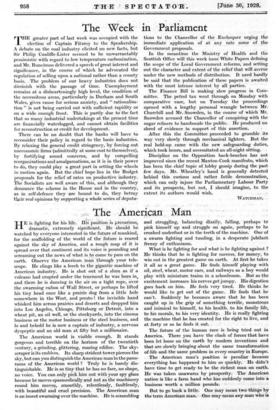The Week in Parliament
Tilgreater part of last week was occupied with the lection of Captain Fitzroy to the • Speakership. A debate on the coal industry elicited no new- facts, but Sir Philip Cunliffe-Lister seemed to be unwarrantably pessimistic with regard to low temperature carbonization, and Mr. Runciman delivered a speech of great interest and significance, in the course of which he advocated the regulation of selling upon a national rather than a county basis. . The problem of our heavy industries does not diminish with the passage of time. Unemployment remains at a dishearteningly high level, the condition of the necessitous areas, particularly in Durham and South Wales, gives cause for serious anxiety, and " rationaliza- tion " is not being carried out with sufficient rapidity or on a wide enough front. This is partly due to the fact that so many industrial undertakings at the present time are financially waterlogged, and cannot obtain facilities for reconstruction or credit for development.
There can be no doubt that the banks will have to reconsider their policy in regard to the basic industries. By relaxing the general credit stringency, by forcing out uneconomic firms (admittedly at some cost to themselves), by fortifying sound concerns, and by compelling reorganizations and amalgamations, as it is in their power to do, they could play a great part in setting the wheels in motion again. But the chief hope lies in the Budget proposals for the relief of rates on productive industry. The Socialists are well aware of this, and although they denounce -the scheme in the House and in the country, as in self-defence they are bound • to do, they betray their real opinions by supporting a whole series of deputa- tions to the Chancellor of the Exchequer urging the immediate application of at any rate some of the Government proposals.
In the meantime the Ministry of Health and the Scottish -Office will this week issue White Papers defining the scope of the Local Government reforms, and setting out the character and extent of the relief that will accrue under the new methods of distribution. It need hardly be said that the publication- of - these papers is awaited with the most intense interest by all parties.
The Finance Bill is making slow progress in Com- mittee. The petrol tax went through on Monday with comparative • ease, but on Tuesday the proceedings opened with a lengthy personal wrangle between Mr. Churchill and Mr.- Snowden, in the course of which Mr. Snowden accused the Chancellor of conspiring with the sugar refiners to bamboozle the public. - He produced no shred of evidence. in support of this assertion. • • After this . the Committee proceeded to grumble . its way very. slowly through mechanical lighters. But the real hold-up came with the new safeguarding duties, which.took hours,a,nd necessitated an all-night sitting.
Discipline on the Opposition back-benches has not improved since the recent Maxton-Cook manifesto, which has been the chief topic of lobby gossip during the past few . days. Mr. Wheatley's hand is generally detected behind this curious and . rather . futile . demonstration; which can only injure the Parliamentary Labour Party and its prospects, , but. not, I should imagine, to the extent its authors would wish.
WATCRIKAN4








































 Previous page
Previous page